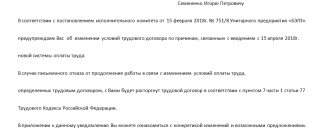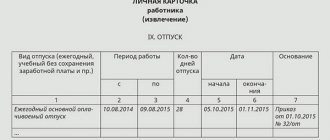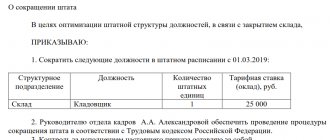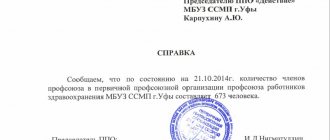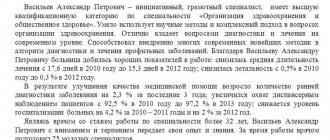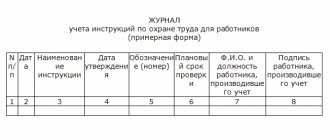The legal topic is very complex, but in this article we will try to answer the question “Anti-corruption clause in a sample contract 2020.” Of course, if you still have questions, you can consult with lawyers online for free directly on the website.
The prohibition does not apply to cases where the Employee receives gifts in connection with protocol events, business trips, other official events and other cases established by federal laws and other regulatory legal acts that determine the specifics of the legal status and specifics of the Employee’s work activity. 3. The employee is obliged to: - notify the Employer (his representative), the prosecutor's office or other government bodies about any persons contacting him for the purpose of inducing him to commit corruption offences; - submit, in the prescribed manner, information about your income, expenses, property and property-related obligations, as well as about the income, expenses, property and property-related obligations of your spouse and minor children;
Or he may be subject to stricter standards, such as having to comply with ethical codes. Of course, in the country in which such a weaker economic party is registered, these norms are not mandatory, so it voluntarily imposes additional restrictions on itself.
Sample form of an anti-corruption clause to an employment contract (prepared by experts)
An employee is prohibited from receiving remuneration from individuals and legal entities in connection with the performance of work duties (gifts, monetary remuneration, loans, services, payment for entertainment, recreation, transportation expenses and other remuneration).
With a literal interpretation of this norm, it follows that each organization independently determines how and in what way it will combat corruption, but is not obliged to do this only by developing and implementing standards and procedures aimed at ensuring the integrity of the organization or taking this measure simultaneously in the aggregate with other countermeasures.
In fulfilling their obligations under the Agreement, the Parties, their affiliates, employees or intermediaries do not pay, offer to pay or authorize the payment of any money or property, directly or indirectly, to any persons for the purpose of influencing the actions or decisions of such persons for the purpose of obtain any improper advantage or other improper purpose.
So, let’s figure out whether an anti-corruption clause in a contract is mandatory or not:
If the circumstances specified in clause 7.2 of this agreement occur, the party for whom it is impossible to fulfill its obligations is obliged to notify the other party about them in writing as soon as possible (no later than 14 calendar days). The occurrence of such circumstances must be confirmed by a certificate from the authorized state bodies of the Russian Federation.
N 44-FZ “On the contract system in the field of procurement of goods, works, services to meet state and municipal needs” (hereinafter referred to as Law No. 44-FZ) The Supplier is obliged to provide the Customer with security for the execution of the Contract in the form of a bank guarantee issued by the bank and meeting the requirements Article 45 of Law N 44-FZ, or by depositing funds into the Customer’s account) (enter as necessary) 2. The amount of security for the fulfillment of obligations under the Agreement is RUB.
This is interesting: Elimination of unauthorized landfills according to which kosg to reflect in 2020
Anti-corruption clause in the contract.
Recently, in my work, I have increasingly come across the fact that contracts have begun to include an anti-corruption clause. Usually it is included in the text of the contract at the initiative of one of the parties to the contract. When checking contracts, I also receive proposals and even demands from counterparties to include such a clause in the contract. In most cases, its inclusion is fundamental and without it the counterparty refuses to enter into an agreement.
Earlier in 2014, I encountered such a situation only when agreeing (drawing) contracts, when one of the parties was a company with foreign origin (investor) related to the western part of the world. For them, the presence of an anti-corruption clause was fundamental and unconditional.
The clause in its content had a reference to the anti-corruption legislation of a foreign state. Despite the objections regarding the presence of this clause, it was still included because concluding an agreement with such a counterparty was beneficial and/or necessary. As is usually the case, commerce wins over common sense: we get the money now, but we don’t know whether there will be problems or not, and if they do, it’s not known when. Well, what can you say? Whose risks are he who makes the decision?
In 2014, similar proposals/demands began to come from Russian companies. Russian companies either did not motivate the need for an anti-corruption clause in any way, or referred to the company’s internal policy, or explained it by the fact that Federal Law No. 273-FZ “On Combating Corruption” dated December 25, 2008, supplemented by Article 13.3 of which organizations are obliged to develop and apply measures to prevent corruption, namely, develop and implement standards and procedures aimed at ensuring the integrity of the organization. Also, to justify the need, counterparties refer to the “Methodological recommendations for the development and adoption by organizations of measures to prevent and combat corruption” developed in pursuance of subparagraph “b” of paragraph 25 of the Decree of the President of the Russian Federation of April 2, 2013 No. 309 “On measures to implement certain provisions Federal Law “On Combating Corruption” and in accordance with Article 13.3 of the Federal Law of December 25, 2008 No. 273-FZ “On Combating Corruption”.
Anti-corruption clause in job description sample
The Director and senior officials of the Institution must form an ethical standard of uncompromising attitude towards any forms and manifestations of corruption at all levels, setting an example by their behavior and familiarizing all employees and contractors with the anti-corruption policy.
Anti-corruption clause in an employee’s employment contract (sample)
The institution makes reasonable efforts to minimize the risk of business relationships with counterparties that may be involved in corrupt activities, for which the tolerance of counterparties to bribery is checked, incl. checking whether they have their own anti-corruption measures or policies, their willingness to comply with the requirements of this Anti-Corruption Policy and include anti-corruption conditions (clauses) in contracts, as well as provide mutual assistance for ethical business conduct and the prevention of corruption.
The fact that there is an anti-corruption clause in the contract, and the consequences of the occurrence of the events specified in it, requires mandatory and strict implementation of its terms, since it is one of the conditions or part of the contract. If the anti-corruption clause contains a reference to a document, for example, Methodological Recommendations or another document, which the parties are obliged to follow in order to fulfill the anti-corruption clause, the parties will be obliged to be guided by this document in their activities, since having signed an agreement with such an anti-corruption clause voluntarily have made this commitment.
Recently, in my work, I have increasingly come across the fact that contracts have begun to include an anti-corruption clause. Usually it is included in the text of the contract at the initiative of one of the parties to the contract. When checking contracts, I also receive proposals and even demands from counterparties to include such a clause in the contract. Often its inclusion is fundamental and without it the counterparty refuses to enter into an agreement. An anti-corruption clause is a special provision of an agreement that requires the parties to such an agreement to follow the requirements of the legislation of the Russian Federation on combating corruption. Failure to comply with this condition of the contract usually entails negative consequences for the party that violated it, usually expressed in the termination of the contract and the application of penalties provided for by law or contract.
Anti-corruption clause in the contract.
Can the owner refuse to pay contributions for major repairs and on what basis? According to current Russian legislation, payment of transport tax (fee) is made not to the federal, but to the local budget.
The inclusion of such a provision in the text of the contract itself or as an annex to it with t.z. law is legitimate, since the public procurement procedure is regulated not only by the law “On the contract system in the field of procurement. » dated 04/05/2013 No. 44-FZ (hereinafter referred to as Law No. 44-F), Art. 2 of the named law.
Employees of private companies most often face commercial bribery from suppliers of goods in order to sell them as quickly as possible. They must also report any such incident to their supervisor.
This is interesting: Amount of disability pension of 3 groups in Belarus
Legislation on anti-corruption policy
The basic principles of countering it, as well as methods of prevention, are enshrined in the Federal Law of December 25, 2008 No. 273-FZ “On Combating Corruption.” Art. 13.3 of the Law obliges heads of organizations to take measures to prevent it. The introduction of anti-corruption provisions into employees' employment contracts, according to legislators, should help them develop intolerance to illegal actions.
From January 1, 2013, all organizations are required to develop and implement anti-corruption measures (Article 13.3 of the Federal Law of December 25, 2008 No. 273-FZ). At the same time, the Methodological Recommendations include in the list of anti-corruption measures:
Let’s figure out whether an anti-corruption clause is required in a contract or not:
Article 13.3 of Federal Law No. 273-FZ “On Combating Corruption” dated December 25, 2008, contains the obligation of organizations to develop and take measures to prevent corruption and it specifies an indicative list of measures to prevent corruption, one of which is the development and implementation of standards and procedures aimed at ensuring the integrity of the organization. This norm has been in effect since 2013.
With a literal interpretation of this norm, it follows that each organization independently determines how and in what way it will combat corruption, but is not obliged to do this only by developing and implementing standards and procedures aimed at ensuring the integrity of the organization or taking this measure simultaneously in the aggregate with other countermeasures. It also follows from this norm that it is focused on organizing anti-corruption efforts within an organization, but not between organizations, and this is correct. Each organization is obliged to independently monitor the prevention of corruption within its organization, as well as its employees when entering into relationships with third parties. It’s another matter when organizations entering into civil legal relations with each other and concluding an agreement include an anti-corruption clause in it.
An anti-corruption clause is one of the measures to combat corruption, but it requires the expression of the will of both parties and one of the parties may express a desire not to indicate this clause in the contract and this is its right.
Refusal, first of all, can be caused by different anti-corruption policies applied in organizations; there is no general standard; everyone implements the requirement of the law in their own way. A legal entity or individual may refuse to indicate an anti-corruption clause without wanting to mix anti-corruption legislation and a transaction, because although they are closely related, they are still different legal relations. To comply with anti-corruption legislation, the parties to the contract are not required to assume additional obligations to each other and/or third parties and bear responsibility for them. Perhaps my reasoning and bad manners, but when carrying out entrepreneurial activities in a rule-of-law state, the persons carrying them out are obliged to comply with the law, and not the imposed will of other persons.
Go ahead,
Anti-corruption clause: how and why to include in contracts
If options I and II are selected, then repeated or significant violation of the anti-corruption provisions of the contract, the Party that violated the provisions has the opportunity to eliminate the violations.
Each of the Parties to this Anti-Corruption Agreement refuses to stimulate in any way the employees of the other Party, including by providing sums of money, gifts, gratuitous performance of work (services) to them and other methods not specified in this paragraph that place the employee in a certain position. dependence and aimed at ensuring that this employee performs any actions in favor of the Party stimulating him. Each of the Parties guarantees that it, its affiliates, employees or intermediaries have not committed the actions specified in paragraphs 1, 2, 3 of this Anti-Corruption Agreement at all stages prior to the conclusion of transactions between the Company and the Counterparty, including participation in procurement (tender) and Negotiation.
The actions of an employee carried out in favor of the Party stimulating him are understood as: providing unjustified advantages compared to other contractors; providing any guarantees; speeding up existing procedures; other actions performed by the employee within the framework of his job duties, but contrary to the principles of transparency and openness of relations between the Parties. If a Party suspects that a violation of any anti-corruption conditions has occurred or may occur, the relevant Party undertakes to notify the other Party in writing.
Federal Law No. 273-FZ “On Combating Corruption” dated December 25, 2008.
Article 13.3 of Federal Law No. 273-FZ “On Combating Corruption” dated December 25, 2008, contains the obligation of organizations to develop and take measures to prevent corruption and it specifies an indicative list of measures to prevent corruption, one of which is the development and implementation of standards and procedures aimed at ensuring the integrity of the organization. This norm has been in effect since 2013.
With a literal interpretation of this norm, it follows that each organization independently determines how and in what way it will combat corruption, but is not obliged to do this only by developing and implementing standards and procedures aimed at ensuring the integrity of the organization or taking this measure simultaneously in the aggregate with other countermeasures.
It also follows from this norm that it is focused on organizing anti-corruption efforts within an organization, but not between organizations, and this is correct. Each organization is obliged to independently monitor the prevention of corruption within its organization, as well as its employees when entering into relationships with third parties.
Rostov-on-Don, Rostov region
"__" __________ 2020
Joint Stock Company "Rostovaeroinvest", hereinafter referred to as the "Company", acting on the basis of power of attorney No. 000/RAI dated 01.01.2001, on the one hand, and
_____________________________________________________________________________, hereinafter referred to as the “Counterparty”, represented by ___________________, acting on the basis of the Charter, on the other hand, collectively referred to as the “Parties”, have entered into this Anti-Corruption Agreement as follows:
When fulfilling their obligations under any transactions concluded between the Company and the Counterparty, the Parties, their affiliates, employees or intermediaries do not pay, do not offer to pay and do not authorize the payment of any funds or valuables, directly or indirectly, to any persons to provide influencing the actions or decisions of these persons to obtain any undue advantage or achieve other unlawful purposes. When fulfilling their obligations under any transactions concluded between the Company and the Counterparty, the Parties, their affiliates, employees or intermediaries do not carry out actions qualified by the legislation applicable for the purposes of this Agreement, such as giving / receiving a bribe, commercial bribery, as well as actions that violate the requirements applicable legislation and international acts on combating the legalization (laundering) of proceeds from crime.
Bribery often includes: - Transfer of part of payments under a contract for party officials, civil servants, employees of other companies, their relatives, partners or friends. — Contacting intermediaries, including subcontractors, agents, consultants, and other third parties, to transfer payments to party officials, government officials or employees of another company, their friends, close relatives or business partners. 2) Extortion of a bribe or inducement to transfer a bribe - a demand for a bribe associated with threats in case of refusal, or without them. Companies undertake to counteract any attempts to extort a bribe or induce them to transfer a bribe. It is strongly recommended that the company report through available official and unofficial channels about such attempts, unless such reporting of circumstances was counterproductive. Otherwise, if an agreement is concluded with a “profitable” counterparty, the agreement will not be signed if the counterparty is against the anti-corruption clause, or the agreement will be signed without an anti-corruption clause in it, and then local acts will be violated if they provide for the presence of an anti-corruption clause in the contract. 3. Why an anti-corruption clause is included in a contract: – As one of the ways to comply with current anti-corruption legislation. – Demonstration by the company’s management of high moral principles and civic responsibility in the fight against corruption.
Why include an anti-corruption clause in a contract:
– As one of the ways to comply with current anti-corruption legislation.
– Demonstration by the company’s management of high moral principles and civic responsibility in the fight against corruption. This depends on the personal worldview of the head(s) of the company, and not on the existence of such an obligation in the law.
– As an event, the occurrence of which entails legal consequences (termination of the contract, payment of fines, payment of compensation, etc.), usually negative for the party for whom such an event occurred.
In which documents and how to implement an anti-corruption clause
The ICC Anti-Corruption Clause is intended to apply to any contract in which it is specified in full or by reference. The main purpose of the Clause is to provide for the Parties to the contract a condition that guarantees compliance with the rules of business ethics on the part of the counterparties in the pre-contractual period, during the term of the contract and even upon its completion. The inclusion of a Clause in a contract is possible in 3 ways: - Short text and incorporation - by reference to Part I of the ICC Anti-Corruption Rules 2011 (Option I), - Incorporation of the entire text of Part I of the ICC Anti-Corruption Rules 2011 into the contract (Option II ), — Reference to the corporate compliance program to ensure compliance with anti-corruption requirements, as provided for in Article 10 of the ICC Anti-Corruption Rules (Option III). If options I and II are selected, then repeated or significant violation of the anti-corruption provisions of the contract, the Party that violated the provisions has the opportunity to eliminate the violations. Also, this Party has the opportunity to refer as objections to the adoption of sufficient preventive measures in the field of anti-corruption policy. If the violating Party does not take due measures aimed at eliminating the identified violations, or if it is impossible to take such measures, and convincing evidence from the Party sufficient to substantiate the objection has not been provided, the other Party has the right to terminate or terminate the agreement at its discretion. Any dispute resolution body, whether an arbitral tribunal or another body, when making a decision in accordance with the provisions of the dispute resolution treaty, is authorized to determine the contractual consequences of the alleged violation of the Clause.
- ICC Arbitration Rules
And so, what do we know about the anti-corruption clause:
- The current legislation of the Russian Federation does not provide for the obligation of business entities to comply with anti-corruption legislation when entering into relationships with each other by including any anti-corruption clauses in the contract.
- The current legislation of the Russian Federation does not establish the obligation to include any anti-corruption clauses in the contract as a basis for the emergence, modification and termination of obligations.
- In the Russian Federation, any actions (inactions) by individuals and legal entities must be performed (refrain from performing them) in accordance with the current legislation, therefore additional indication of the need to comply with an obvious fact already established and enshrined in law is not required. Regardless of whether an anti-corruption clause is included in the contract or not, business entities are required to comply with anti-corruption legislation. But in the absence of an anti-corruption clause in the contract, business entities are guided only by the rules of law and are responsible to the state, and if it is present in the contract, business entities, in addition to the rules of law, will have to be guided by the terms of the anti-corruption clause and be responsible for its violation to each other.
- The fact that there is an anti-corruption clause in the contract, and the consequences of the occurrence of the events specified in it, requires mandatory and strict implementation of its terms, since it is one of the conditions or part of the contract.
- If the anti-corruption clause contains a reference to a document, for example, Methodological Recommendations or another document, which the parties are obliged to follow in order to fulfill the anti-corruption clause, the parties will be obliged to be guided by this document in their activities, since having signed an agreement with such an anti-corruption clause voluntarily have made this commitment.
Sample anti-corruption clause for a contract
«1.
When concluding and (or) executing this Agreement, the Parties, their affiliates, employees do not pay, do not offer to pay and do not authorize the payment of any funds or valuables in any form, either directly or through intermediaries, to any persons to influence actions or decisions of these persons with the aim of maintaining or obtaining any unlawful advantages in business activities.
When concluding and (or) executing the Agreement, the Parties, their affiliates, employees or intermediaries do not carry out actions qualified by the legislation applicable for the purposes of the Agreement as giving or receiving a bribe, commercial bribery, as well as actions to legalize (launder) proceeds from crime. 2. If the Parties suspect that a violation of any provisions of this Article has occurred or may occur, the relevant Party undertakes to notify the other Party in writing.
In a written notification, the Party is obliged to refer to facts or provide materials that reliably confirm or give reason to believe that a violation of any provisions of this article has occurred or may occur by the counterparty, its affiliates, employees or intermediaries, expressed in actions qualified by applicable law as or receiving a bribe, commercial bribery, as well as actions to legalize proceeds from crime.
Upon written notification, the relevant
Anti-corruption provisions in an employment contract: sample
The LLC plans to develop a local act regulating measures to prevent and combat corruption. Is it necessary to include in an employment contract a provision on the implementation of measures to prevent and combat corruption? Is it necessary to indicate in the employment contract the conditions for compliance with the provisions of the specified local act?
Having considered the issue, we came to the conclusion:
The parties have the right, but are not obligated, to provide in the employment contract an additional condition regulating the implementation of measures related to preventing and combating corruption, with reference to the relevant local act.
Rationale for the conclusion:
First of all, we note that corruption is abuse of official position, giving a bribe, receiving a bribe, abuse of power, commercial bribery or other illegal use by an individual of his official position contrary to the legitimate interests of society and the state in order to obtain benefits in the form of money, valuables, other property or services of a property nature, other property rights for oneself or for third parties, or the illegal provision of such benefits to the specified person by other individuals. Corruption also means committing the listed acts on behalf of or in the interests of a legal entity (Clause 1, Article 1 of Federal Law No. 273-FZ of December 25, 2008 On Combating Corruption,” hereinafter referred to as Law No. 273-FZ). Anti-corruption - the activities of federal government bodies, government bodies of constituent entities of the Russian Federation, local governments, civil society institutions, organizations and individuals within the limits of their powers (clause 2 of Article 1 of Law No. 273-FZ):
a) to prevent corruption, including identifying and subsequently eliminating the causes of corruption (prevention of corruption);
b) to identify, prevent, suppress, disclose and investigate corruption offenses (fight against corruption);
c) to minimize and (or) eliminate the consequences of corruption offenses.
At the same time, according to Art. 13.3 of Law N 273-FZ, organizations are required to develop and take measures to prevent corruption, which may include: identifying units or officials responsible for the prevention of corruption and other offenses; cooperation of the organization with law enforcement agencies; development and implementation of standards and procedures aimed at ensuring the integrity of the organization; adoption of a code of ethics and official conduct for employees of the organization; prevention and resolution of conflicts of interest; preventing the preparation of unofficial reports and the use of false documents. As you can see, Law N 273-FZ, while stipulating the obligation of an organization, regardless of its form of ownership, to develop and take measures to prevent corruption, in no way regulates the issue of the mandatory inclusion of these provisions in the text of the employment contract. Accordingly, in this part the employer must be guided by the norms of labor legislation.
In connection with the above, we note that, as a general rule, the regulation of labor relations is carried out by regulatory legal acts of state authorities and local self-government, as well as collective agreements, agreements and local regulations containing labor law norms (Article 5 of the Labor Code of the Russian Federation). From the totality of the norms of Art. Art. 8, 15, 21, 22 of the Labor Code of the Russian Federation it follows that the employee’s responsibility is not only to perform a labor function, but also to comply with the norms of the collective agreement, agreements, local regulations, and employment contracts. Accordingly, the failure to indicate a reference to one or another local act in the employment contract does not make it optional for the employee in this case. As a result, after the employer approves a local regulatory act regulating measures to prevent and combat corruption, and familiarizes the organization’s employees with it, it becomes mandatory for execution, regardless of the presence or absence of a corresponding reference to it in the employment contract.
At the same time, we recall that in Art. 57 of the Labor Code of the Russian Federation establishes a classification of the terms of an employment contract, according to which they are divided into: mandatory for inclusion in the employment contract and additional. Thus, among the list of mandatory conditions, the condition on the obligation to implement measures to prevent and combat corruption is not mentioned. At the same time, according to part five of Art. 57 of the Labor Code of the Russian Federation, by agreement of the parties, an employment contract may also include the rights and obligations of the employee and employer established by labor legislation and other regulatory legal acts containing labor law norms, local regulations, as well as the rights and obligations of the employee and employer arising from the conditions of collective contracts, agreements.
Thus, the parties have the right, but are not obligated, to provide in the employment contract an additional condition regulating the implementation of measures related to preventing and combating corruption, with reference to the relevant local act * (1).
Answer prepared by: Expert of the Legal Consulting Service GARANT Pavlova Natalia
Response quality control: Reviewer of the Legal Consulting Service GARANT Victoria Komarova
The material was prepared on the basis of individual written consultation provided as part of the Legal Consulting service. For detailed information about the service, contact your service manager.
*(1) By analogy, see the documents regulating the implementation of measures related to preventing and combating corruption in public sector organizations, which also indicate recommendations for including this clause in the employment contract (Methodological recommendations on measures to increase the effectiveness of prevention and counteraction corruption offenses in organizations subordinate to the Ministry of Culture of the Russian Federation).
Answer
From January 1, 2013, all organizations are required to develop and implement anti-corruption measures (Article 13.3 of the Federal Law of December 25, 2008 No. 273-FZ). At the same time, the Methodological Recommendations also include “Introduction of a standard anti-corruption clause into contracts related to the economic activities of an organization” to the list of anti-corruption measures.
In other words, we are talking about a mandatory part of formalizing relations with a counterparty. There is no administrative liability for failure to include these clauses, but there are no grounds for refusal.
The rationale for this position is given below in the materials of the “Lawyer System”
.
2. Introduction to contracts related to the economic activities of the organization, a standard anti-corruption clause
The methodological recommendations follow the experience of English legislation (UK Bribery Act). It is based on the inclusion of so-called anti-corruption clauses in contracts with counterparties, which are aimed at:
- to establish the legal obligations of the parties to the contract regarding anti-corruption behavior;
- to create a legal framework for monitoring counterparties for compliance with anti-corruption legislation.
An example of a standard anti-corruption clause that can be included in contracts with counterparties*
"1. In fulfilling their obligations under the Agreement, the Parties, their affiliates, employees or intermediaries do not pay, offer to pay or authorize the payment of any money or property, directly or indirectly, to any persons for the purpose of influencing the actions or decisions of such persons for the purpose of obtain any improper advantage or other improper purpose. When fulfilling their obligations under the Agreement, the Parties, their affiliates, employees or intermediaries do not carry out actions qualified by the legislation applicable for the purposes of the Agreement as giving or receiving a bribe, commercial bribery, as well as actions that violate the requirements of applicable legislation and international anti-money laundering acts. ) proceeds from crime.
2. If the Parties suspect that a violation of any provisions of this Article has occurred or may occur, the relevant Party undertakes to notify the other Party in writing. In a written notification, the Party is obliged to refer to facts or provide materials that reliably confirm or give reason to believe that a violation of any provisions of this Article has occurred or may occur by the counterparty, its affiliates, employees or intermediaries, expressed in actions qualified by applicable law as or receiving a bribe, commercial bribery, as well as actions that violate the requirements of applicable legislation and international acts on combating the legalization of proceeds from crime. After written notification, the relevant Party has the right to suspend the performance of obligations under the Agreement until it receives confirmation that a violation has not occurred or will not occur. This confirmation must be sent within ten working days from the date of written notice.
3. If one Party violates the obligations to refrain from actions prohibited in this section and (or) the other Party fails to receive confirmation within the period established by the Agreement that the violation has not occurred or will not occur, the other Party has the right to terminate the Agreement unilaterally in whole or in part, by sending written notice of termination. The party on whose initiative the Agreement was terminated in accordance with the provisions of this Article has the right to demand compensation for actual damage arising as a result of such termination.”
At the same time, it is worth remembering the risks arising from the possible ambiguous interpretation of such provisions by regulatory authorities.
Thus, the Federal Antimonopoly Service issued order No. 1 10/91-10 in relation to Novo Nordix LLC, in which it recognized the anti-corruption clause, which requires Novo Nordix LLC to conduct an audit in case of doubt regarding the compliance of partners, as inconsistent with Russian competition law anti-corruption legislation.
I approve
CEO
_____p/p_______V.V. Konovalov
Order No. __525__dated _21___11___2014
Agreement
on compliance with the requirements of the Anti-Corruption Policy of the Altai Instrument-Making Open Joint Stock Company
Barnaul "___" _________2014
Open Joint Stock Company "Altai Instrument-Making,
hereinafter referred to as the “Employer”, represented by ________________________, acting on the basis of _________________________________________ on the one hand, and ________________________, hereinafter referred to as the “Employee”, have entered into this employment contract as follows:
1. The employee is familiar with the Anti-Corruption Policy of OJSC APZ Rotor, approved by Order No. ___ dated __ __________ 2014 (hereinafter referred to as the Anti-Corruption Policy), and undertakes to comply with the requirements established by the Anti-Corruption Policy.
2. The employee, when performing his labor duties under the Employment Agreement in accordance with the Anti-Corruption Policy, undertakes not to commit corruption offenses, i.e. – do not give bribes (do not mediate in bribery), do not abuse authority, do not participate in commercial bribery or other unlawful use of your official position contrary to the legitimate interests of OJSC APZ Rotor for the purpose of free of charge or taking advantage of obtaining benefits in the form of money valuable papers, other property, including property rights, works or services of a property nature, for one’s own benefit or for the benefit of other persons, or to obtain advantages or achieve other illegal goals.
3. The Employee is obliged to notify the Employer if any persons contact him in order to induce him to commit corruption offenses, as well as in cases where the Employee becomes aware that organization (preparation) and/or committing corruption offences.
4. The Employee is obliged to take measures to prevent any possibility of a conflict of interest arising within the meaning of the Anti-Corruption Policy and legislation of the Russian Federation and to immediately notify the Employer of a conflict of interest that has arisen or of the possibility of its occurrence as soon as he becomes aware of it.
5. The Employee is aware that the Employer does not subject him to penalties (including the application of disciplinary sanctions), and also does not fail to accrue bonuses (other payments) or accrue bonuses (other payments) in a smaller amount in relation to the maximum possible amount , if the Employee informed the Employer about the alleged fact of a corruption offense.
6. The employee is aware that the Employer encourages employees to provide confirmed information about corruption offenses at OJSC APZ Rotor.
The Employee's compliance with the principles and requirements of the Anti-Corruption Policy is taken into account when nominating the Employee for higher positions.
7. The employee is warned about the possibility of being brought to disciplinary, administrative, civil and/or criminal liability in accordance with the procedure established by the legislation of the Russian Federation for violation of anti-corruption requirements provided for by the legislation of the Russian Federation, as well as the Anti-Corruption Policy.
8. This agreement on compliance with the requirements of the Anti-Corruption Policy comes into force on “___”_________2014, and is valid until the termination (termination) of the employment contract No. ____ dated “___”_______________2014.
9. This agreement on compliance with the requirements of the Anti-Corruption Policy is an integral part of the Employment Agreement, drawn up in two copies having equal legal force. One copy of this agreement is kept by the Employer in the employee’s personal file, the second copy is kept by the Employee.
10. Details and signatures of the parties.
Anti-corruption provisions in employee employment contracts (sample)
Update: April 19, 2020
Sample employment contract with anti-corruption clause
The employer's primary task when including anti-corruption provisions in employees' employment contracts is to prevent corruption offenses on the part of employees related to giving or offering a bribe, commercial bribery, or illegal benefits for themselves and their relatives. Anti-corruption policy at an enterprise is an element of legal culture on both the part of the employer and the part of employees.
What the ICC Anti-Corruption Clause prohibits
1) Bribery - the transfer, promise, offer, authorization or receipt of any unlawful property or other benefit to or from certain persons specified above or other persons in order to retain or obtain unlawful commercial or other advantages. In particular, when concluding a supply contract for private or public needs, obtaining permits from regulatory authorities, customs clearance, taxation, litigation, or legislative process. Bribery often includes: - Transfer of part of payments under a contract for party officials, civil servants, employees of other companies, their relatives, partners or friends. — Contacting intermediaries, including subcontractors, agents, consultants, and other third parties, to transfer payments to party officials, government officials or employees of another company, their friends, close relatives or business partners. 2) Extortion of a bribe or inducement to transfer a bribe - a demand for a bribe associated with threats in case of refusal, or without them. Companies undertake to counteract any attempts to extort a bribe or induce them to transfer a bribe. It is strongly recommended that the company report through available official and unofficial channels about such attempts, unless such reporting of circumstances was counterproductive.
3) Abuse of influence for personal gain - inducement or offer to obtain unlawful benefits in order to exert unlawful perceived or real influence on a civil servant for the purpose of undue advantage in favor of the original initiator of these actions or any other person. 4) Laundering of proceeds - from the corrupt practices listed above, or concealment of the criminal origin, deposit, source, method of disposal, movement or ownership, if it is known that this property was obtained due to the commission of a crime.
Anti-corruption clause in an employee’s employment contract (sample)
The inclusion by the employer of an anti-corruption clause in all employment contracts with employees is part of measures aimed at compliance with legislation on corruption.
In addition to anti-corruption provisions in employee employment contracts, organizations are recommended to develop and approve a code of ethics and official conduct of employees in the organization, as well as carry out special anti-corruption procedures, including filling out a declaration of conflict of interest, rotation of employees whose official position may influence decision-making or be associated with receiving money and other material assets (benefits, advantages) in the performance of official duties.
The obligation to take and develop measures in your company aimed at preventing corruption is regulated by Federal Law dated December 25, 2008 No. 273-FZ “On Combating Corruption.”
At the same time, the legislator provides organizations with freedom both in terms of developing special anti-corruption procedures and in terms of formulating anti-corruption provisions in contracts, both civil and labor, so there are no official samples of such documents. Here is a sample of an anti-corruption clause in an employee’s employment contract.
employment contract with anti-corruption clause
Signing the anti-corruption clause
From January 1, 2013, all organizations are required to develop and implement anti-corruption measures (Art.
13.3 Federal Law dated December 25, 2008 No. 273-FZ).
At the same time, the Methodological Recommendations also include “Introduction of a standard anti-corruption clause into contracts related to the economic activities of an organization” to the list of anti-corruption measures. In other words, we are talking about a mandatory part of formalizing relations with a counterparty. There is no administrative liability for failure to include these clauses, but there are no grounds for refusal.
The rationale for this position is given below in the materials of the Lawyer System.
Recommendation. 2. Introduction to contracts related to the economic activities of an organization, a standard anti-corruption clause. Methodological recommendations follow the path of experience in English legislation ().
It is based on the inclusion of so-called anti-corruption clauses in contracts with counterparties, which are aimed at:
- to establish the legal obligations of the parties to the contract regarding anti-corruption behavior;
- to create a legal framework for monitoring counterparties for compliance with anti-corruption legislation.
An example of a standard anti-corruption clause that can be included in contracts with counterparties* “1. In fulfilling their obligations under the Agreement, the Parties, their affiliates, employees or intermediaries do not pay, offer to pay or authorize the payment of any funds or valuables,
We recommend reading: Is it possible to re-register a car if the tax has not been paid?
Anti-corruption procedures
Among the anti-corruption measures in the organization are the following:
- use of an anti-corruption clause in an employee’s employment contract. Such a clause, as a rule, implies the employee’s obligation not to commit and, if possible, prevent possible corruption offenses; the obligation to notify the employer about the fact of committing a corruption offense and the possible circle of persons involved in it; the employee’s right to remuneration for providing such information; failure to bring an employee to disciplinary liability in the event of reporting a corruption offense and non-application of criminal prosecution measures if the fact of participation and violation of the provisions of the legislation on corruption is proven;
- employee training, including familiarization of all employees with the legal regulation in the field of anti-corruption in general, including international and at the enterprise in particular; clarification of legislation; prevention; consideration of practical situations;
- anti-corruption measures when hiring. First of all, such measures are aimed at preventing conflicts of interest associated with the possible subordination of the employee’s relatives or members of his family or, for example, the participation of relatives in decision-making that could bring the employee unjustified material benefits, etc.
Regulatory regulation
The principles of preventing corruption and combating this phenomenon are established in Law No. 273-FZ. Article 13.3 obliges legal entities and individual entrepreneurs to take measures to prevent corruption and defines disciplinary, administrative, civil and criminal liability in relation to employees. In Art. 14 defines the liability of legal entities.
One of the measures to prevent corruption is the inclusion of anti-corruption clauses in employment contracts. However, management has the right to independently decide whether they are needed. The text is not fixed in the regulations, but you can use the methodological recommendations that are located on the website of the Ministry of Labor. The management of the enterprise may limit itself to issuing internal regulations governing this issue and training employees.
Introduction of anti-corruption provisions in employee employment contracts
The anti-corruption mark is highlighted in a separate paragraph containing:
- definition of the concept of “corruption” (receiving and giving bribes, bribery, use of official position for personal benefit, etc.);
- an indication of the obligation to comply with the terms of the enterprise’s anti-corruption regulations;
- a list of actions that constitute a violation of anti-corruption legislation;
- employee responsibilities: not to commit offenses, inform management about facts of corruption;
- management notification procedure;
- responsibility for violations.
Separately, it is necessary to indicate that all employees are required to comply with the anti-corruption regulations, regardless of their position and duties.
When drawing up the document, the features of the structure and scope of activity of the enterprise are taken into account. The manager is obliged to ensure that the employee carefully studies this point.
A new TD with an anti-corruption clause can be found here.
Sample TD with anti-corruption clause
How the clause is applied
Within the framework of Art. 13 of Law No. 273-FZ, in practice the corresponding articles of the Criminal Code (Criminal Code) are applied:
According to these articles, managers at various levels are subject to large fines, prohibitions to engage in certain activities, forced labor, restrictions and imprisonment.
For ordinary employees under Art. 13 of Law No. 273-FZ, the provisions of Art. 192 of the Labor Code, which defines the concept of “disciplinary sanction”. An employer may terminate an employment agreement for:
- Parts 5, 6,9, 10 Art. 81 TK;
- clauses 7 and 7.1 part 1 art. 81;
- clause 1 art. 336.
These points define the actions of employees, giving the employer grounds to use loss of trust as a reason for dismissal:
- disclosure of trade secrets;
- actions of a financially responsible person that resulted in material damage;
- making decisions by the accountant, manager and his deputy that resulted in material damage;
- failure by the manager or his deputy to fulfill their labor duties.
How to protect your rights
However, applying TC is not easy. This is possible only in relation to employees involved in servicing goods and funds on the basis of an additional agreement on liability. If this is a collective agreement, upon dismissal it is necessary to prove the degree of guilt of each employee. The employer is given 1 month from the date the misconduct was discovered and six months from the date the violation was committed (Article 193 of the Labor Code). The employer must prove that the employee’s actions are sufficient to cause loss of trust.
Evidence must be substantiated and documented. Even if damage to material assets or shortages are detected, the employee cannot be fired until his guilt is proven. Evidence may include customer complaints about measurements, calculations, weighting, receipt of payment without providing a receipt, reports from other employees, accounting data, and inventory results.
- You can be fired either for a one-time offense or for systematic violations if an internal investigation is carried out. The dismissal order is issued on the basis of the documents listed above. If there is a shortage, the statement of claim must contain a clause regarding compensation for damages, since such amounts cannot be deducted from the salary.
- An employee who is temporarily transferred to a place associated with material assets cannot be fired unless there is a separate agreement on financial responsibility indicating the terms of the combination.
The employee must take all these circumstances into account before filing a claim in court with a request to declare the dismissal illegal. It is necessary to take into account that financial responsibility can be fixed not only in the employment contract, but also in the service instructions.
From judicial practice we can conclude that dismissed employees are reinstated if the employer does not understand the standards defined in the Labor Code. Dismissal under Art. 81 requires serious preparation. Without sufficient evidence, the court will reinstate even an employee who has actually committed offenses worthy of loss of trust.
The video below will tell you what a high-quality TD should contain:
What is an anti-corruption clause
An anti-corruption clause is a special provision of an agreement that requires the parties to such an agreement to follow the requirements of the legislation of the Russian Federation on combating corruption. Failure to comply with this condition of the contract usually entails negative consequences for the party that violated it, usually expressed in the termination of the contract and the application of penalties provided for by law or contract. The use of this kind of clause is one of the anti-corruption measures provided for by law (Article 13.3 of the Law “On Combating Corruption” dated December 25, 2008 No. 273, hereinafter referred to as Law No. 273).
Such a clause can be included in any type of agreement.
For example, the following can be considered as examples of an anti-corruption clause in a contract:
- section 7 standard contract for the provision of services..., approved. by order of JSC Russian Railways dated 06/09/2016 No. 1113r;
- section 4 provisions “On the procedure for interaction. ", approved. by order of JSC Russian Railways dated 05.08.2013 No. 1685r, etc.
When drawing up an anti-corruption program for an organization, including when developing an anti-corruption clause in a contract, one should rely on special Methodological Recommendations (this document does not have unique details and can be found in the current version on the website of the Russian Ministry of Labor).
What is the essence of the anti-corruption clause?
Anti-corruption clauses usually oblige the economically weaker party to adhere to certain standards and regulations. Often the consequence of such a policy is the need to comply with supplier codes of ethics or, at a minimum, foreign statutory law. If the agreement is violated, the other party has the right to terminate further performance of the contract or insist on compensation for losses. Also, if violations are suspected, the other party can obtain control rights. Control rights generally do not comply with strict Russian data privacy standards. At the same time, general obligations under the contract in matters of compliance with certain standards and provisions often lead to unreasonable difficulties for the other party, becoming invalid due to the norms of Russian legislation. In particular, an unreasonable difficulty may arise when a contract imposes on one party the obligation to comply with certain foreign legal norms, even when the norms in certain cases are not prescribed for execution by current legislation. Similarly, it is common for a supplier to be required to assume obligations in relation to sub-suppliers - regardless of the nature and extent of their breaches, it is likely to be void, provided they fall within the general terms and conditions.
A contract provision can be characterized as a general provision (condition) if it was not previously specifically agreed upon by the parties when drawing up the contract, and the party intending to apply this provision did not intend to discuss its use with the business partner.
- Contract negotiations and pre-contractual liability
Anti-corruption clause under Law No. 44-FZ
The inclusion of such a provision in the text of the contract itself or as an annex to it with t.z. law is legitimate, since the public procurement procedure is regulated not only by the law “On the contract system in the field of procurement. » dated 04/05/2013 No. 44-FZ (hereinafter referred to as Law No. 44-F), Art. 2 of the named law.
For example, in accordance with Art. 422 of the Civil Code of the Russian Federation, every agreement must meet the requirements of mandatory norms established by law at the time of conclusion of the agreement (contract), which include the requirements of Law No. 273 (see, for example, the decision of the OFAS commission for the Tambov region dated 02/26/2016 in the case No. RZ-19/16).
In addition, we also recommend that you read Art. “Corruption in public procurement.”
IMPORTANT! The inclusion of an anti-corruption clause in the text of a contract within the framework of Law No. 44-FZ, as well as the inclusion of such a provision in the text of other types of contracts, is not mandatory by law, since Art. 13.3 of Law No. 273 also contains other options for the subject to implement anti-corruption program measures. If such a clause is present in the contract, it must be strictly fulfilled, since it is one of the conditions of the contract.
Anti-corruption clause in an employment contract
Every employer is obliged to comply with the requirements of the law, including implementing in practice anti-corruption measures provided for in Art. 13.3 of Law No. 273. One of such measures can be used to include an anti-corruption clause in the contract (but again, the choice of measure is left to the discretion of the employer).
An anti-corruption clause in the text of an employment contract may, for example, read as follows: “The employee undertakes to comply with the employer’s anti-corruption policy aimed at combating corruption in the organization and obtaining information about possible facts of corruption offenses,” etc.
Such a clause can also be included in the service contract of a civil servant (see also Decree of the President of the Russian Federation “On implementation measures.” dated April 2, 2013 No. 309).
So, an anti-corruption clause is one of the conditions of the contract, and the purpose of this condition is to ensure that the parties to the transaction comply with the provisions of the legislation of the Russian Federation on combating corruption.
The reader may also be interested in our materials on other types of clauses:
Basic principles of anti-corruption in an organization
When creating a system of anti-corruption measures in an organization, it is recommended to be based on the following key principles:
- The company's policy cannot contradict the law;
- The manager must set a personal example for employees and develop in them a culture of intolerance towards corruption;
- The employer is obliged to inform employees about the provisions of the law relating to this issue;
- The measures taken should help reduce the likelihood of employees of the organization being involved in corrupt activities, be easily implemented and effective;
- Employees of the organization need to be notified of their responsibility for promoting corruption and punishment.
- The company's policies must be known to partners and the public;
- The manager is obliged to monitor the process of carrying out activities and evaluate their effectiveness.

